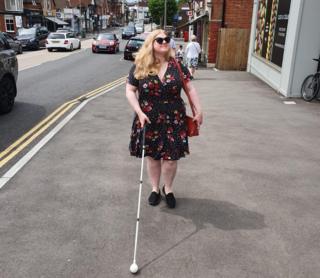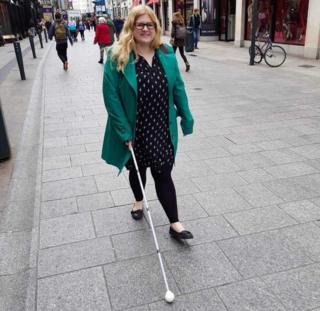Image copyright
Bronwyn Berg
Bronwyn Berg became so fed-up with people manhandling her without asking, she put spikes on her wheelchair. And she’s not alone. With a spate of disabled people reporting unwanted touching some are taking action to stop it in its tracks.
You’re minding your own business when – out of nowhere – a man you’ve never met puts his hands on your wheelchair. He starts to push you down the street and you have no control over where you’re going.
This happened to Berg. “It was really terrifying,” she says. Despite her screams “not a single person stopped to help”.
“I thought: ‘How is it that nobody is helping?’ If I was able-bodied and a man had picked me up, would I have had a different experience?”
Berg, who has used a wheelchair since she acquired a brain injury five years ago, added metal spikes to the handles of her chair to make it harder for people to take control of her after this incident.
The spikes, which don’t puncture the skin, were homemade by her partner Hal after he noticed she became anxious whenever she heard approaching footsteps.
Image copyright
Brownwyn Berg
“The heart of it is I want to feel safe in the world,” says Berg, who does feel safer now she has the spikes. She explains that her wheelchair is an extension of herself and if someone grabs it, it’s the same as someone grabbing hold of her.
Being touched or grabbed by a stranger without warning or consent is still an all too-common experience for many disabled people. Although people believe they’re being helpful with their actions, an invasion of personal body space can be frightening.
After accepting assistance from someone who asked her first, disabled pedestrian Chloe Tear tweeted: “I really appreciate people OFFERING support, rather than assuming I need it.”
If someone approached a non-disabled adult and touched them, you wouldn’t be entirely surprised if they were shouted at, or even accused of assault.
So why, in this era of awareness, do complete strangers act without asking?
“I think a lot of people in the UK panic about disability,” says Dr Amy Kavanagh, a visually impaired campaigner.
“It makes them feel awkward and we know a lot of people don’t want to interact with disabled people very much so they panic and their natural instinct is to use their hands and not their words.”
 Image copyright
Image copyright
Dr Amy Kavanagh
Research from the charity Scope found two thirds of the British public feel uncomfortable when talking to disabled people. In particular, those aged 18-34 were twice as likely than older people to feel awkward.
Dr Kavanagh has always had low vision but noticed a significant change in attitude towards her two years ago when she started to use a white cane when out and about.
“I had this magical new thing which gave me my independence,” she says. “But I was suddenly experiencing the world as a visibly disabled person – and it made me realise how differently people would treat you if they perceive you to be incapable of doing things by yourself.”
She found she was being touched almost every day and it troubled her so much that she started a campaign to highlight the matter.
Hundreds of tales of unwanted touching have since been shared by disabled women and men using the hashtag #JustAskDontGrab – and some give details of the kind of things that go wrong when people do this.
 Image copyright
Image copyright
Dr Amy Kavanagh
“Bus driver pushed my wheelchair sideways to centre me and touched cushion near my legs both w/o asking. Wasn’t malicious or creepy, just dehumanising, like I was luggage” wrote Kati on Twitter.
“Pushing my wheelchair can cause injury to me & expensive damage to my chair. Touching me even lightly can cause excruciating pain,” posted Kirsty Farnfield.
“A man just tried to ‘help’ me by pushing me off a tram before Barney said it was safe to go,” Stephen Anderson wrote on Facebook. “I applied reasonable force to get him away from me… When you have a guide dog in one hand and two bags in the other, it is extremely dangerous to try and throw me around.”
Other disabled people have reported broken knuckles and dislocated fingers as a result of being pushed or pulled without being consulted.
And Berg believes the problem arises because disabled people “inspire feelings of pity, guilt and fear”.
“One thing I want to get across is it’s OK to ask if we need help. I’m not opposed to being helped. There are times when I’ve needed help getting up a hill, for example.
 Image copyright
Image copyright
Browyn Berg
“But don’t be defensive if we say ‘no’,” says Berg. “I’m not a a touchy person, I’m an introvert.”
For disabled women, some strangers giving assistance can border on unwanted sexual touching, which takes the problem to another level.
Dr Kavanagh says that around twice a month she experiences men who “grope me, make inappropriate sexual comments or try and physically stop me leaving a location”.
She says: “Being touched by strangers happens every single day and even those well-intentioned touches – I’m not a slim lady so when someone grabs my arm they’re often grazing a bosom – it’s just a very intrusive and personal act without my consent.”
Dr Kavanagh says the seriousness and frequency of the problem makes her feel like an “oddity” who needs assistance.
“Disabled people can be independent and that is something society shouldn’t be frightened of.”
For more Disability News, follow BBC Ouch on Twitter and Facebook, and subscribe to the podcast.
